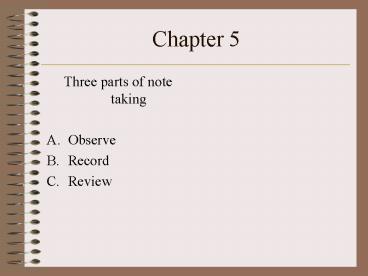Three parts of note taking - PowerPoint PPT Presentation
1 / 17
Title:
Three parts of note taking
Description:
Accept wandering mind (and gently bring it back) Notice writing (make note when ... Journaling. Jump in and start writing. Make lists of quotes, people, etc. ... – PowerPoint PPT presentation
Number of Views:35
Avg rating:3.0/5.0
Title: Three parts of note taking
1
Chapter 5
- Three parts of note taking
- Observe
- Record
- Review
2
Chapter 5
- Set the stage
- Complete outside assignments before class
- Bring right materials (pens, paper, notebook,
book) - Sit front and center
- lessens distractions
- Harder to fall asleep
- Hear and see better
- Usually make better grades
- 4. Conduct pre class review (5 minutes
before, during, or after class) - 5. Clarify intentions
3
Chapter 5
- Be here now in class
- Accept wandering mind (and gently bring it back)
- Notice writing (make note when mind drifts)
- Be with instructor
- Notice environment (windows, air conditioning)
- Postpone debate (if you don't agree, can't ignore
it. Make note and move on) - Let go of judgments about classes and lectures
- Participate
- Relate the class to your goals
- Think criticially about what you hear
4
Chapter 5
- Watch for clues
- 1. Repetition
- 2. Transition phrases
- C 3. Watch board or overhead
- D 4. Watch instructor's eyes or interest level
- e. 5. Highlight obvious clues
5
Chapter 5
- Cornell Format
- Draw vertical line 1 1/2 inches from left of
margin - Put class notes to right of line
- Keywords to left of line
6
Chapter 5
- Mind maps
- Good for left handed people
- Visual and unstructured
- Use keywords only
7
Chapter 5
- Types of notes
- Outlines
- Paragraphs
- Key words
8
Chapter 5
- Note-Taking Skills
- Use pictures or diagrams
- Copy all material from board
- Use a three-ring binder
- Use one side of paper
- Use index cards
- Keep each thought separate
- Use I'm lost signals (spaces in notes, tic marks,
etc) - Label, number, and date all notes
- Use abbreviations
- Leave spaces
- Note Taking Skills Continued
- K. Use complete sentences as much as
possible - L. Take notes in colors
- Use graphics and symbols
- Record effectively when learning online
- O. Print it out
- P. Summarize material into your notes
9
Chapter 5
- Tape recorders
- Advantages
- back up to your notes
- good if your instructor talks fast
- Disadvantages
- technology problems
- time consuming
10
Chapter 5
- Review
- Review within 24 hours
- Edit your notes
- Fill in key words when using Cornell format
- Use keywords to recite
- Conduct short, weekly reviews (1 hour minimum)
- Consider typing them
- Use mind maps
11
Chapter 5
- Improve your handwriting
- Admit it is a problem
- Use creative visualizations
- Keep eye on pen
- Demonstrate excellence
- Revise sloppy writing immediately
- Practice with best materials
- Take a calligraphy course
- Dot I's and cross T's
- Leave spaces
- Notice problem letters
- Slow down
- Appreciate value of legible writing
12
Chapter 5
- Create Your Instructor
- Research them
- Show an interest in class
- Take responsibility for your attitude
- Get to know the instructor outside of class
- Open up to diversity
- Separate liking from learning
- G. Form your own opinions and don't be
influenced by others
- Create Your Instructor Continued
- H. Submit professional work
- I. Arrive early
- J. Accept criticism
- K. Use conference time or office hours
- L. Use course evaluations
- M. Take further steps if you still feel
discriminated against
13
Chapter 5
- When Instructor Talks fast
- Take more time to prepare for class
- Make choices about what is important
- Exchange notes with other students
- Leave empty spaces in notes
- See instructor after class
- Tape recorders
- Take notes on reading before class
- Go to another lecture
- Learn shorthand
- Ask questions
- Ask them to slow down
14
Chapter 5
- Journaling
- Jump in and start writing
- Make lists of quotes, people, etc.
- Improves critical thinking skills
- Play with learning styles
- Re read journal regularly
- Good for managing stress
- Enhances writing skills
- Good for personal growth and development
15
Chapter 5
- Take notes while reading
- Research notes
- Used in speeches and papers
- Use index cards
- Information cards what you found
- Source cards where you found information
- Use a computer
- Review notes
- Similar to the ones you take in class
16
Chapter 5
- Power Process 5 I create it all
- All about accepting responsibility for your
actions and not blaming others - Resignation when you give control to other
people, you risk eventually giving up - You choose your thoughts, feelings, and behaviors
17
Chapter 5
- Raul Julia
- wanted to be an actor since childhood (first play
at 5 years old) - father owned restaurant in Puerto Rico
- childhood issues influence adult life
- founded the Hunger Project when he became success
- way of giving back and taking responsibility
- F. went beyond just cultural to help all
human beings


















![NOTE: To appreciate this presentation [and ensure that it is not a mess], you need Microsoft fonts: PowerPoint PPT Presentation](https://s3.amazonaws.com/images.powershow.com/6577720.th0.jpg?_=20150513116)












